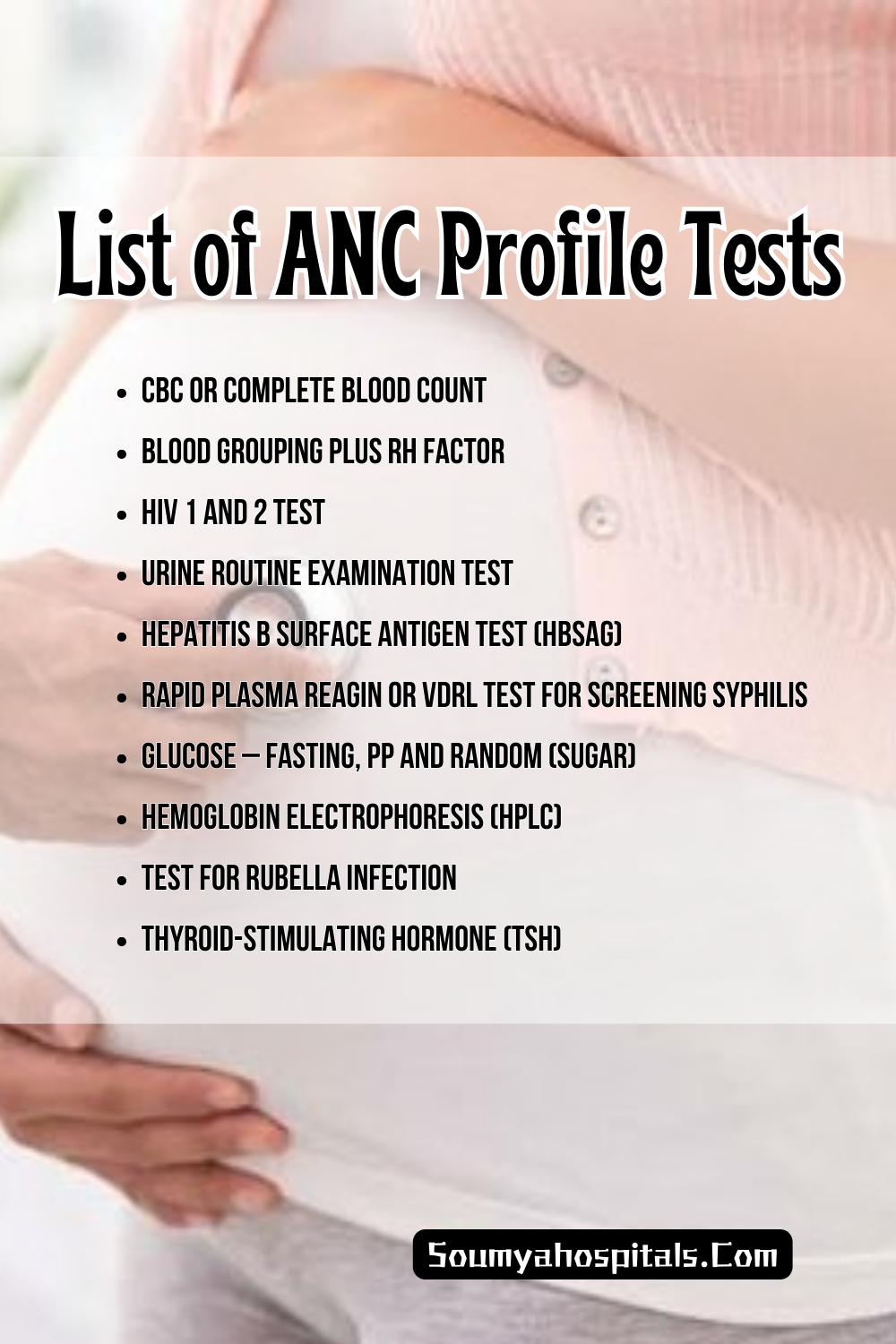Important Tests during pregnancy help check the baby's growth and health, as well as the mother's well-being.
ANC Profile tests are widely used in modern obstetrics and gynaecology. Recently, this test has become the most routine pregnancy follow-up process. Along with these screening tests, a wide range of tests including blood tests and ultrasound baby scans. All these Pregnancy Check-Ups and Tests make your pregnancy safer and check the development and well-being of you and your baby.
Also Check: Asthma During Pregnancy
Every pregnant woman needs to know the purpose of tests so that they can make a wise decision on whether to take them or not. Patients will get to know about these prenatal tests from their regular gynaecologist.
What are Antenatal Screening Tests?
Antenatal tests help to know that you and your baby are healthy throughout pregnancy. These are an important part of your well-being during pregnancy. Multiple tests include blood tests, urine tests and ultrasound scans.
Few of these tests are mandatory for everyone, while others are recommended if there is a greater chance that you and your baby have a particular condition. At your first antenatal visit, your doctor will explain which antenatal tests are recommended for you.
List of ANC Profile Tests

Antenatal Care Profile test is a combination of blood and urine tests. The list includes a wide range of tests that help evaluate any new or pre-existing lifestyle disease, nutrient deficiency or transmissible infection. The following are the tests:
- CBC or Complete Blood Count
- Blood grouping plus RH factor
- HIV 1 and 2 test
- Urine routine examination test
- Hepatitis B surface antigen test (HbsAg)
- Rapid plasma reagin or VDRL test for screening syphilis
- Glucose – fasting, PP and random (Sugar)
- Hemoglobin electrophoresis (HPLC)
- Test for rubella infection
- Thyroid-stimulating hormone (TSH)
Overview of ANC Profile Test During Pregnancy
An antenatal screening test is done for pregnant women to evaluate the health of the mother and the baby. Doctors recommend it during the first trimester of your pregnancy. It also helps to identify pre-existing infections.
| Also known as | Antenatal /Prenatal screening, ANC Profile, Antenatal Panel, Prenatal Test |
| Purpose | Helps detect health problems during pregnancy to avoid complications |
| Preparation | Do not take any over-the-counter medicine without confirming with your doctor |
| Fasting Time | No |
| Reports Within | 15 Hours |
Symptoms That Call For An Antenatal Care Profile Test
Basically, the ANC Profile Test is conducted as part of prenatal care, few symptoms may require the immediate need for the Antenatal Care Profile Test. Those signs are along the lines:
- Vaginal Bleeding: Vaginal bleeding during the initial stages of pregnancy is one of the major signs that something is wrong and it needs testing. It indicates some underlying conditions that might need an examination to ensure timely intervention of prevention measures and treatment.
- Severe Or Persistent Abdominal Pain: Unusual and severe abdominal pain during pregnancy is another important sign that needs an ANC test to know any complications. Continuous pain can be a sign of ectopic pregnancy, miscarriage or preterm labor.
- Decreased Fetal Movement: When gynaecologists feel decreased fetal movements, they might suggest taking this prenatal test to ensure that the baby is doing well.
- Severe Nausea & Vomiting: Morning sickness and vomiting are the common symptoms during pregnancy. However severe and consistent nausea may need medical check to prevent further complications.
- High Fever Or Signs Of Infections: Pregnant women with high fever or signs of infections may require an ANC test to find the problems early and prevent harm to the mom and baby. A few viral infections are common during pregnancy, but doctors suggest medical tests to confirm their status and provide medical treatment accordingly.
- Abnormal Results From Routine Tests: If routine pregnancy tests indicate abnormal results, your doctors may suggest an Antenatal Care Profile (ANC) Test that confirms the cause & recommends appropriate treatment.
Purpose of ANC Profile Test
Doctors will advise you to take the antenatal profile test during the first trimester of the pregnancy. It helps to detect any infection in the expecting mother that can affect the baby or conditions like thyroid, diabetes and so on.
ANC tests can help identify risks to the developing baby and thus help to inform and prepare parents for the birth of an affected infant, to allow in-utero treatment or delivery at special care for immediate postnatal treatment and to enable the termination of an affected fetus.
Preparations for ANC Screening Test
As it is a simple blood test, the Antenatal Care Profile Test requires no special preparations. However, general guidelines that one must follow include the following:
- The Antenatal screening needs no dietary restriction, which means you can get tested at any time. However, if you are on a special diet, you may be asked to first. Therefore, confirm it with a healthcare provider before the test.
- Persons taking medicines have to inform their doctor of the same and follow their instructions accordingly. Don’t stop or take any medications without proper guidance.
- Avoid the intake of any food or element that could interfere with the test results.
- Stay calm, as anxiety can also influence the test results.
- If you still have any concerns, it is good to clarify them with your healthcare provider or phlebotomist to avoid discrepancies in the test results.
Procedure For ANC Profile Test

The details steps involved in the ANC Blood Test are here:
For A Blood Test:
A lab technician may tie a band around your arm and ask you to make a fist so the vein can be identified easily. They will then clean the area with a disinfectant.
- A needle is inserted to draw the blood using a syringe.
- Once the required amount of blood is collected, the syringe will be removed, and the blood will be stored in a tube.
- The phlebotomist will then apply a bandage on the punctured site to prevent further bleeding.
- Finally, the band will be removed and it’s done.
- The procedure may cause a little discomfort or slight pain at the time of blood withdrawal. It will only take 5-10 minutes.
For Urine Test:
Your lab assistant will give you a sterile container and ask you to collect urine samples on that. The urine sample will be tested.
FAQS on ANC Screening Test
1. What is ANC in pregnancy?
Antenatal care (ANC) test is conducted to know the well-being of the mother and fetus.
2. What is ANC Profile Test Full Form?
The Antenatal Care Profile Test is the full form of the ANC Profile test. It is performed on pregnant women to access their overall health and the growth of the baby.
3. What is a normal ANC level for a woman?
The normal ANC range for a woman is 1.5 to 8. Neutrophils are the key components in the system of defence against infection.
Final Words
We are expecting that we have shared enough information about the ANC Profile Test. Pregnant women can get loads of information about the prenatal test and get rid of anxiety before the test. Stay tuned to Sowmyahospitals.com for more similar data.
Read More Posts:
